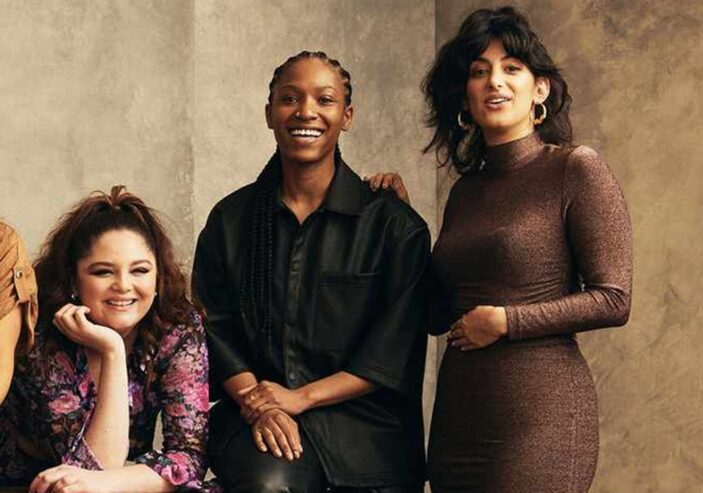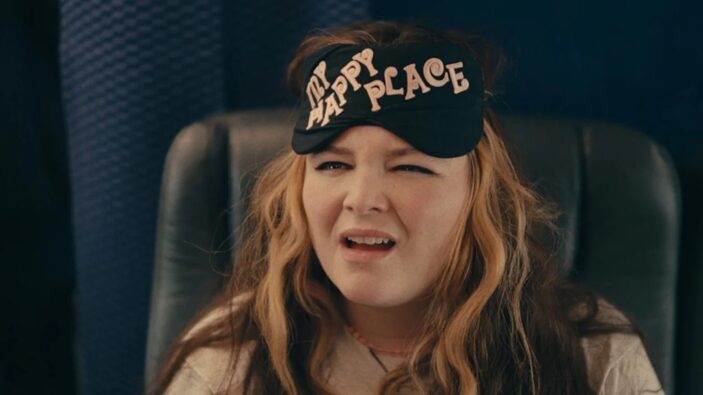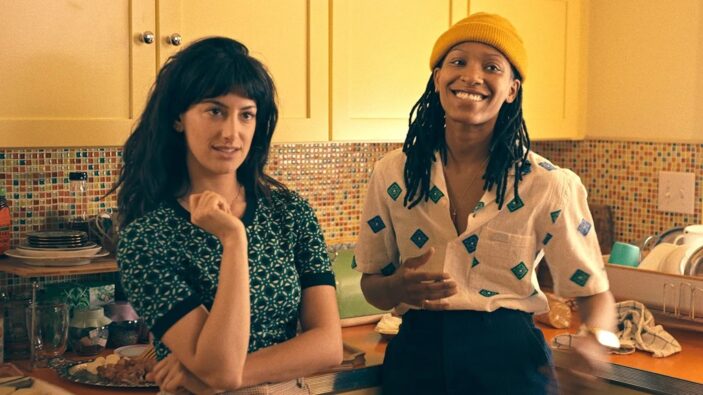
After premiering at last year’s SXSW Film & TV Festival, the acclaimed Cora Bora is finally introducing herself to the masses; the film is set for a release in theatres in the United States from June 14th.
Starring Megan Stalter (TV’s Hacks) as the titular Cora, the film tells of her fear that her relationship isn’t going well, and so she returns home to win her girlfriend back, realizing along the way how much more than her love life needs salvaging.
To coincide with the release of the film, Peter Gray spoke with Stalter and co-stars Jojo T. Gibbs and Ayden Mayeri about finding the authenticity and relatability in their “unlikeable” characters, and what they noticed about working on a predominant female-led set.
I saw this film at SXSW last year, so I’m so happy to see it receive a theatrical release, because I responded so positively to it then. As a gay man, I love seeing queer stories being told with authenticity. I feel like we’re starting to see more movies with queer elements, as well as more written by women and directed by women. For all of you, are you seeing more opportunities come from female and/or queer creatives as actresses?
Ayden Mayeri: What was really unique about this film was that all the heads of department were women. You have a female writer, director, producers…a lot of the crew was female, and it was noticeable as an actress starring in it. I guess most sets are mostly men, so it was unusual. It does feel like, at least with this group, that there’s an effort being made. I feel like I’m seeing more effort. What do you (both) think?
Megan Stalter: Yeah, I definitely feel like, even with this movie, that it’s a testament to the different stories we didn’t get to see growing up. I think we still have a long way to go, but it’s definitely incredible. The difference is when there’s so many women around – and there are definitely good, good boys out there as well – but when you’re surrounded by women in charge, it’s like everyone just has this understanding and patience on set. I don’t know, it’s so gentle. Everyone was just holding hands, smiling, and laughing all day (laughs).
Ayden Mayeri: Even the straight men we worked with (on set) were so much nicer!
You have songs in the film like “Dreams Are Stupid and So Are You”, and I’m wondering is that your input at all Megan? Or is that all the amazing script work?
Megan Stalter: Oh yeah, no, we did not improvise the songs. The songs, the music, the lyrics were already in the script. It’s so funny! I cannot take credit for any of the music, except for the amazing singing I did (laughs).

This next question will be quite long winded, but it’s open up for all of you. Initially, someone like Cora could be so easily dismissed as a character because of her selfishness and that unrealistic mentality she has. In your hands, Megan, she’s super, super endearing, and we get that emotional elevation of the character. How much of that was on the page, and how much did you shape Cora? And for you, Jojo and Ayden, with your character, Justine and Riley, they’re also painted with deeper brushstrokes as well. How do you make these characters likeable in a situation where they can so easily be deemed as the opposite?
Megan Stalter: I think it’s easy to love Cora. It started with me and Hannah (Pearl Utt, director) and the writer (Rhianon Jones), like everyone that I was working with, even before we started shooting, were just talking about how much we loved Cora. It’s easy to forgive her when you realise how much she’s carrying around. I think when you realise that all someone wants is to be loved, then you’re like, “Okay, that’s so endearing and beautiful.” It makes you forgive her when she’s being a bitch (laughs). There are so many moments where she’s mean, or, you know, there’s that scene where she runs into the old friend and says, “Yeah, I guess I’ll text you when I’m bored later.” But it’s coming from her because she has so many guards up because she’s lost so much. How can you not love her? All she wants is connection and friends.
Jojo T. Gibbs: I think everyone has a Cora in their life to some extent. I have a friend that is similar to Cora, in the regard that (I) know who she truly is, but she’s a little hard to get through that first outer shell. But, like Cora, you know that she’s a good person at the end of the day and she’s just going through things and had tough experiences that shaped their trust. I think having that perspective can create empathy for an audience (too).
Megan Stalter: Yeah, Cora may act like a brat, I don’t know if we’re allowed to curse, but a bratty bitch (laughs), a naughty girl…but she’s actually a sweet person who’s just lost, I think. I think it’s really endearing when someone just wants to connect.

One of the things that I related to when watching the film was being reminded of a time in my life where I had people take advantage of me and it absolutely caused me to put certain walls up. I understand Cora in that regard. She may be saying something that sounds mean, but it’s coming from a place where you don’t want to necessarily let someone in.
Megan Stalter: I think Jojo’s right in that everyone has a Cora, or we are all a little bit Cora, and it’s finding those qualities that make her likeable. She has the potential to be unlikeable, but I think everyone loves her because she’s trying her best.
Ayden Mayeri: I think all our characters are trying their best. I’ve certainly been a Cora, and it was after, as you were saying Peter, a dark time where everything hurts so much, and you don’t want to be hurt anymore, and you’re defensive. But then I’ve also been the person who’s taking care of that person, like (Jojo’s character). My character just wants her to be better, but she’s getting burnt out in trying to fix her. It’s a lot of complicated characters. Nobody is one note in this movie.
